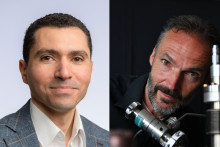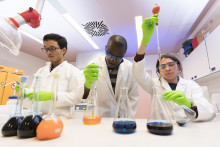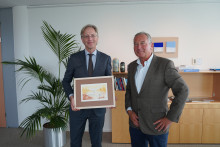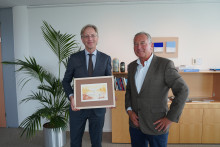The Wireless Robotic Clot Retrieval for Vascular Intervention ( WCR) project of researcher Islam Khalil aims to develop a unique, wireless robotic system to improve medical procedures for retrieving clots – which are responsible for strokes and heart attacks, among other things. Khalil is working on this together with co-applicants and UT professors Stefano Stramigioli, Pascal Jonkheijm, Gabreille Tuijthof and with researchers from the Radboud University Medical Center.
This technology offers an alternative to the traditional methods for which a catheter is used. Khalil's research aims to optimize wireless robotics to improve patient outcomes. In total, this project receives more than 900 thousand euros in funding.
New generation of phones
Professor Harold Zandvliet is researching the development of a so-called multiprobe atomic force microscope cantilever for performing mesoscopic transport measurements on two-dimensional materials'.
The funding for this amounts to more than 5 tons, of which more than a ton is co-financing from spin-off company Bruker of Roelof Huijink. Zandvliet explains: 'Within this research, we are going to look at a double-layer graphene. By twisting this material slightly, you get interesting patterns, with unique layers. The application of this is intended for a new generation of electronic devices, such as mobile phones. For example, a new graphene layer can lead to better conductivity of transistors in telephones. And Bruker can market that again.'
Societal impact
The Open Technology Programme provides funding for application-oriented technical-scientific research that is 'free and unfettered and unfettered by disciplinary boundaries', according to the press release. The programme offers companies and other organisations an accessible way to connect with scientific research that should lead to social and/or scientific impact.
A total of 6 projects from Dutch researchers receives funding and NWO will contribute more than 4.9 million euros and the business community will contribute another 700 thousand euros.







